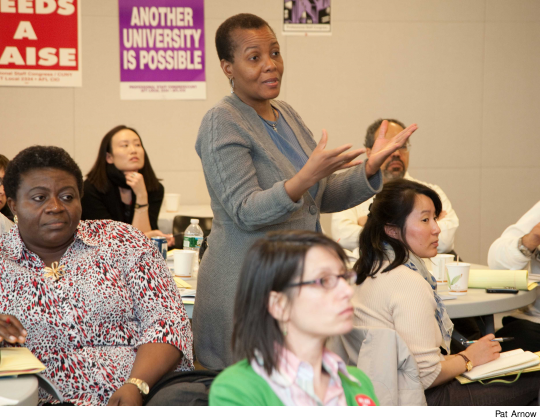 |
“What makes for a really good mentor?”
“How are book chapters valued as opposed to peer-reviewed articles?”
“Why do some people get non-reappointed before their tenure clock is up?”
These were just a few of the questions posed at the PSC’s annual Junior Faculty Development Day on March 12.
BE PRO-ACTIVE
Held at the PSC Union Hall, the event drew more than 75 junior faculty from across the CUNY system. They listened to, and participated in, panel discussions in which tenured colleagues shared information on the ins and outs of the tenure process, how to assert one’s rights under the contract, and ways to obtain more funding and support for their research.
Panelists emphasized that expectations and practices vary across colleges and departments, and can also change over time – and that junior faculty have to be pro-active in shaping their careers.
“Your first job is to be a good ethnographer of your own institution and understand how it works and how you fit in,” said Glenn Petersen, chair of the sociology and anthropology department at Baruch. “There’s no ‘one-size-fits-all.’ You have to be engaged.”
Junior faculty receive one-year appointments until a decision is made by the end of their seventh year on whether to grant tenure. All decisions on their employment must be based on the written record in their personal file. The panelists encouraged everyone present to be thorough in documenting their work. Attendees were also reminded that they have a right to see everything that goes into their file and to attach their own written comments.
EVALUATIONS
“Create a paper trail,” said Julie George, an associate professor of political science at Queens College. George also emphasized the importance of cultivating a research niche and a network of academics at other colleges who will be willing to provide external letters of support when one comes up for tenure.
“I’ve heard it before, but it was good to hear it again,” Andra Ghent, a third-year assistant professor at Baruch’s Zicklin School of Business, said about the reminders to build a paper trail. The discussion led her to put a couple of things on her to-do list, she said.
Many junior faculty say they face rising research expectations while also carrying heavy teaching loads and expectations to serve on a variety of departmental and college committees. In the contract agreement reached in 2006, the PSC doubled junior faculty reassigned time for scholarly work from 12 to 24 hours, expanding a right the union first won in 2002. However, many participants were unaware that they could advocate with their department chair for how they would like to take this time.
“This is the first time I’ve heard [about this],” said one junior faculty member, who described how their department initially gave incoming junior faculty a lighter teaching load of two courses per semester without explaining that there were other options.
Bob Cermele, professor of mathematics at City Tech and the college’s PSC chapter chair, urged attendees to put their research plan on paper and present it to their department chairs. “Writing is a powerful thing,” he said.
“Reassigned time is not there to help a college balance its books. It’s not there to make your chair’s life easier,” added Associate Professor of Sociology Timothy Shortell, the contract enforcement officer at Brooklyn College. “It’s there to enhance your scholarly production.”
Saavik Ford, assistant professor of astronomy at BMCC, urged junior faculty who are struggling with a large teaching load to carve out one day a week for their research. “Teaching can consume all your time if you let it,” she warned.
In the panel discussion on research, junior faculty were encouraged to make the most of every resource at their disposal – from becoming familiar with one’s college grants office, to working in collaboration with other institutions to seeking grant money to facilitate undergraduate research, to reaching out to the college’s communications department to get one’s accomplishments highlighted on the college website.
‘GET THEM EXCITED’
“Know of the administrators at your college and what proposals will get them excited and willing to help you,” advised Sarah Durand, associate professor of biology at LaGuardia.
Payal Doctor, a first year assistant professor of philosophy at LaGuardia, said she found the day’s discussions informative and helpful. “It’s really refreshing,” she added, “to know there’s somebody sticking up for us, that there’s a bigger unit and it’s not just everyone for themselves.”

